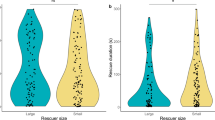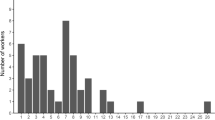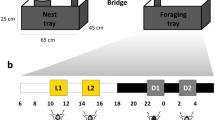Abstract
A STUDY similar to that reported recently1 was made last summer into the response of worker ants (Formica fusca) to dead specimens of their own species. The results of this preliminary observation are those averaged over four observation periods. These are presented in Table 1. From this it will be noted that at least two factors influence response: (1) a state of unrest, caused by a disturbance of the nest (for example, by mechanical force; introduction of members of another colony), this action considerably reducing the retreat response; (2) distance of the dead ant from the nest entrance; where this is less than 4 cm. there is a strong response on the first encounter to remove the dead ant.
This is a preview of subscription content, access via your institution
Access options
Similar content being viewed by others
References
Studd, J. H., Nature, 179, 431 (1957).
Author information
Authors and Affiliations
Rights and permissions
About this article
Cite this article
HUNT, T. A Response of Worker Ants to Dead Ants of their Own Species. Nature 179, 875–876 (1957). https://doi.org/10.1038/179875b0
Issue Date:
DOI: https://doi.org/10.1038/179875b0
Comments
By submitting a comment you agree to abide by our Terms and Community Guidelines. If you find something abusive or that does not comply with our terms or guidelines please flag it as inappropriate.



